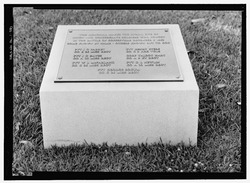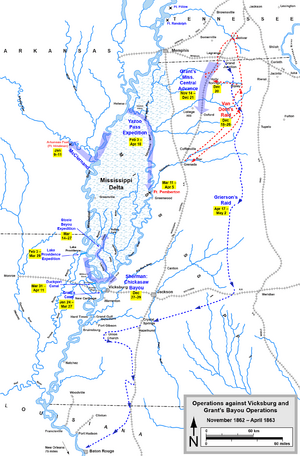Battle of Coffeeville facts for kids
Quick facts for kids Battle of Coffeeville |
|||||||
|---|---|---|---|---|---|---|---|
| Part of the American Civil War | |||||||
 Battle of Coffeeville Monument, Mobile National Cemetery, Mobile, Alabama |
|||||||
|
|||||||
| Belligerents | |||||||
| Commanders and leaders | |||||||
| Units involved | |||||||
| Cavalry, Army of the Tennessee | 1st Corps, Army of West Tennessee | ||||||
| Strength | |||||||
| 1,500-3,500 2 artillery pieces |
1,300-2,500 6 artillery pieces |
||||||
| Casualties and losses | |||||||
| 10-34 killed 54-234 wounded 43 captured |
7 killed 43 wounded 10 missing |
||||||
The Battle of Coffeeville, fought on December 5, 1862, was a military clash during the American Civil War. It took place near Coffeeville, Mississippi. In this battle, Confederate forces successfully ambushed and pushed back Union cavalry. This fight helped stop a major Union advance into Mississippi.
Contents
Why the Battle Happened: The Background
By late 1862, the Union Army had won important battles in Northern Mississippi. These victories included Shiloh and Corinth. Union General Ulysses S. Grant then started a big plan. He wanted to capture Vicksburg, a key city on the Mississippi River.
Grant's plan involved two parts. He would lead his army overland (by land) through Mississippi. His goal was to follow the main railroad line, capturing towns and rail lines as he went. At the same time, General William Tecumseh Sherman would move south along the river.
Meanwhile, the Confederate army, led by Major General Earl Van Dorn, was retreating. They had been defeated at the Battle of Corinth. They kept falling back through towns like Oxford and Coffeeville. Union cavalry (soldiers on horseback) were chasing them closely. These cavalry units were ahead of Grant's main army.
Who Fought: The Armies
In the Battle of Coffeeville, two main groups faced off.
The Union Army
The Union forces were mostly cavalry (soldiers on horseback). They were part of the Army of the Tennessee. Their commander was Colonel Theophilus Lyle Dickey. These cavalry units were scouting ahead of General Grant's main army. They also had some artillery (cannons) with them.
The Confederate Army
The Confederate forces were from the 1st Corps of the Confederate Army of West Tennessee. Major General Mansfield Lovell was their overall commander. Brigadier General Lloyd Tilghman led a key division. The Confederates had infantry (foot soldiers), cavalry, and more artillery than the Union side.
The Battle Itself
Outside Coffeeville, the Confederate commanders decided to set a trap. They wanted to stop the Union cavalry that was chasing them. On December 5, Confederate soldiers hid on a wooded ridge. This ridge was next to the road leading to Coffeeville. Brigadier General Lloyd Tilghman led this ambush. His troops included infantry and artillery, supported by cavalry units.
Around 2:30 PM, the Union Cavalry, led by Colonel Theophilus Lyle Dickey, came close to Coffeeville. When they were about 50 yards from the hidden Confederates, the trap was sprung. Confederate artillery fired first, followed by many shots from their infantry.
After a short but fierce fight, the Confederates pushed the Union Cavalry back. The Union soldiers retreated about three miles. They fell back towards where Grant's main army column was. The Confederates stopped chasing them and returned to their ambush spot. The Union Cavalry then retreated further, back to Water Valley. The fighting lasted from about 4 PM until it got dark.
The Battle of Coffeeville was a success for the Confederates. It forced General Grant to stop his advance into Mississippi. He pulled his army back to Oxford for a time.
 | Shirley Ann Jackson |
 | Garett Morgan |
 | J. Ernest Wilkins Jr. |
 | Elijah McCoy |


